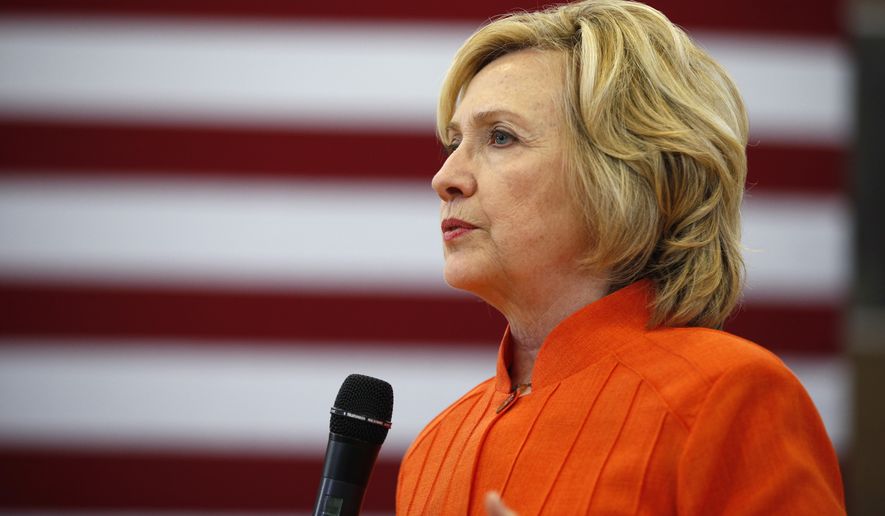The Democratic presidential field is backing a tough crackdown on Americans’ greenhouse gas emissions, but their campaigns have clammed up when asked what steps they’re taking personally to reduce their own carbon footprint as they jet across the country seeking votes.
Party front-runner Hillary Rodham Clinton has gone the furthest, publicly committing to running a “carbon neutral” operation, though her campaign hasn’t said exactly what that entails.
Former Rhode Island Gov. Lincoln Chafee’s campaign ducked direct questions, saying only that he stands by his past environmental record.
And the three other major announced candidates — Vermont Sen. Bernard Sanders, former Maryland Gov. Martin O’Malley and former Virginia Sen. Jim Webb — didn’t respond to requests sent to their campaigns seeking their own plans for carbon neutrality.
It’s a far cry from 2008, when the Democratic presidential field competed to be the most carbon-conscious, paying companies for “offsets” to cover the emissions of their own campaign caravans, airplanes and offices.
Critics say the near-silence of Democratic candidates this time around only highlights the hypocrisy of those who constantly sound the alarm on global warming yet do little, if anything, to cut their own carbon footprint.
“If everybody is going to be holy, then you better be sure you’re holy if you’re going to tell other people how to live,” said Michael McKenna, a Republican strategist, former Energy Department official and president of the lobbying firm MWR Strategies. “How does it look to the rest of the world when people like Secretary Clinton, President Obama, even Al Gore, sit there and preach to them about how they need to reduce their carbon footprint and then get on their jet and fly to one of their numerous homes?”
The Clinton campaign last month announced that it would seek to be carbon neutral. But the campaign did not respond to requests for comment on how it would achieve that goal and whether it has begun buying carbon offsets.
In 2008 Mrs. Clinton made a similar commitment and backed it up with action. FEC records show the Clinton campaign spent more than $80,000 on offsets in 2007 and 2008, with all of the money going to Vermont-based company Native Energy, a leading offset provider.
Fellow Democrat John Edwards spent more than $15,000 on carbon offsets in 2007 and 2008, also working with Native Energy in the hopes of running a carbon-neutral campaign, federal election records show.
Then-Sen. Barack Obama did not commit to run a carbon neutral campaign and only offset some of his airplane flights, not his entire campaign operation.
The offsets, popular among some private companies, are intended to essentially make up for harmful emissions generated by flights, campaign buses and offices. The candidates pay for the planting of trees or other environmental projects that, in theory, make up for those greenhouse gases and would have not occurred otherwise.
But critics contend that the whole concept of offsets is flawed and does not represent a true effort on the part of a candidate to reduce his carbon footprint. They argue that paying a third party to plant trees or take other steps to protect the environment, rather than actually reducing real carbon emissions, misses the point of running a carbon neutral campaign.
It’s also difficult to fully track offset projects and truly know whether they wouldn’t have occurred without payments from a given campaign.
Moving forward, as climate change likely becomes a bigger issue in the Democratic primary, powerful environmental activist groups say each candidate’s actions on carbon neutrality will be one of many important factors to consider — though they also hint that a given campaign’s carbon footprint certainly will not be a deal-breaker.
“The campaign ahead is a long one, and we’re going to be considering many issues, and carbon neutrality is one of them,” said Edwin Chen, spokesman for the Natural Resources Defense Council, one of the nation’s most powerful environmental groups.
While climate change has emerged as a top issue in the Democratic presidential primary, carbon neutral campaigning seems to be much less of a priority.
Only Mr. Chaffe’s camp responded to The Washington Times, though it did not directly address questions about carbon neutrality.
“Gov. Chafee is very proud of his record on the environment as mayor, governor and U.S. senator,” Chaffe spokeswoman Debbie Rich said in an email.
Still, the Democratic candidates have voiced real concern over climate change and also have come out in support for much of President Obama’s ambitious global warming agenda, which centers on reducing carbon emissions from power plants and automobiles, cutting methane pollution from oil and drilling sites, as well as a host of other steps.
Mr. O’Malley, for example, has gone even further than the president and has said the U.S. must get off of fossil fuels within the next 35 years.
Mr. Obama has said the U.S. must get off of fossil fuels by the end of the century.
“Let’s square our shoulders to the threat of climate change by moving America forward to a 100 percent clean electric energy supply by 2050, and create 5 million new jobs along the way,” Mr. O’Malley said during an Iowa speech last week.
On the other side of the political spectrum, conservatives are zeroing in on the issue and using it as a way to paint Democrats, such as Mrs. Clinton, as hypocrites.
Last month, the conservative super PAC America Rising circulated video footage showing Mrs. Clinton boarding her private plan after an appearance in New Hampshire.
Shortly after the video’s release, the Clinton campaign announced it would go carbon neutral.
• Ben Wolfgang can be reached at bwolfgang@washingtontimes.com.




Please read our comment policy before commenting.